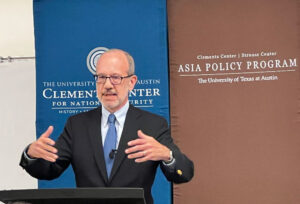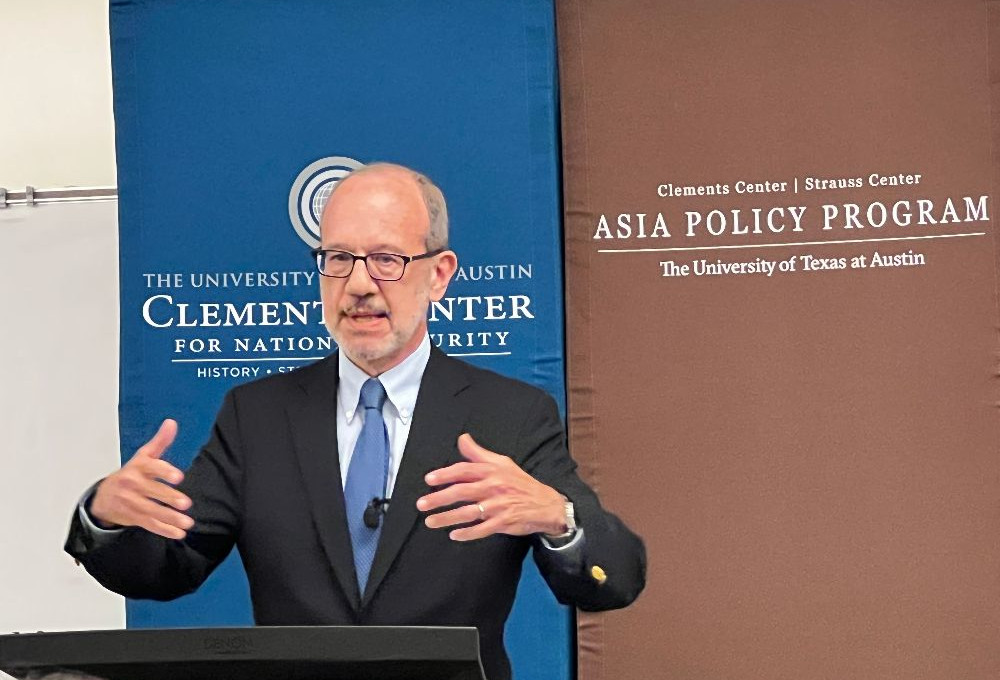Our engagement with China has been wrong for decades. Disastrously wring.
This is the assessment of Aaron L. Friedberg, Professor of Politics and International Affairs at Princeton University. He outlined America’s toubled relationship with China to an audience at the LBJ School of Public Affairs in Austin
Getting China Wrong is the title of his new book. The consequences are already severe, and may eventually be fatal to freedom and liberty across the entire planet.
Friedberg began with stating a painful fact: “We are in a new Cold War with two Eurasian powers: Russia and China. The book deals with the bigger and more dangerous of those two powers.”
Declaring that “Unconditional economic engagement was a major error,” Friedberg surveyed the last few decades since Nixon opened up China to the U.S. (another thing we can thank him for, right after Watergate). “There was a widespread belief that engagement would create tendencies to encourage liberal theory upon which policy was based. None of these things have come to pass. Rather, China has shifted towards state-driven economic policies. Far from liberalizing it has become more repressive than ever. By any reasonable definition, the policy of engagement has failed.”
The current Administration is not blind to this reality. “If you read the statements by the Biden Administration officials now, what they say in effect is ‘we have failed to induce or force China to make those changes. We now need to deal with this reality of a big and prosperous economic actor that’s inside our system and exploiting our openness but not playing by the rules we assumed they would be playing by.’”
The wily Chinese turned the tables on the West, using engagement to further their own evil ends. “Over the last 30 years the Communist rulers have done everything to preserve the Leninist regime. The task of preserving their grip on power is everything they do. The Chinese Communist Party (CCP) leadership recognized there were enormous benefits engaging with the West. The main reason for engaging was to encourage growth, then reshape prevailing aspects of the post-war order.” They are intent, he said, “on regaining their position as the prepondering power in Asia, and eventually as superior to the United States.”
Engagement itself, in the Chinese view, was “viewed as a trap,” so they decided to build their own mousetrap by taking all the benefits showered upon them by unwitting leaders (including Carter and Reagan) and giving nothing tangible in return. “They have always been unwavering Leninists,” Friedberg warned darkly. “Since the early 1990s they have used ideological indoctrination. The latest variants include an increase of the repressive component, including concentration camps and the use of high tech. There has also been an important shift in the ideological program: the objective is the great rejuvenation of the great Chinese nation. Marxism has been pushed to one side – the nationalist goal has become the most important element.”
He likened the economy of China, which has developed with Western help, to a “Bird in a cage. Something dynamic and important that has to be kept alive but also has to kept under control. The cage is the party state. There has been fear that if market forces in fact were allowed to run their course they would undermine and weaken the CCP. So, the party has never abandoned the idea that ultimately the market must be subordinate to and controlled by the party state. They never intended the bird to fly free!”
The CCP is, by all accounts, feeling quite good these days. How do they assess what is going on? “From what I can tell,” said Friedberg, “there is no evidence that they believe they’ve past their peak. On the contrary, I think they believe that they have the wind at their back. Xi (the Pres. Of China) likes to say The East is Rising and the West is Declining. From their perspective, yes, we have all sorts of problems but the problems of the West are even worse.”
His book, which includes 35 pages of notes, highlights the “brutally repressive and extraordinarily corrupt” CCP. “China’s leaders live well,” the author writes, “but they also live in perpetual fear of internal unrest. The regime’s insecurity is manifest in its furious attempts to intimidate and silence foreign critics of its barbarous abuse of its Uighur minority, its obliteration of any remnants of political freedom in Hong Kong, and its evident mishandling of the early stages of the COVID-19 pandemic.”
A sobering but immensely important look at China, Friedberg’s book is an excellent analysis of what has got us into another Cold War. How we all survive this one will require a united front in yet another battle of good vs evil.
This presentation was hosted by the Clements Center and the Asia Policy Program, University of Texas at Austin. Photo by C. Cunningham
Getting China Wrong is published by Polity. It lists for $29.95.
Dr. Friedberg has been on the faculty of Princeton since 1987. In January 2022 he was appointed to a two-year term on the Congressional US-China Economic and Security Review Commission.

